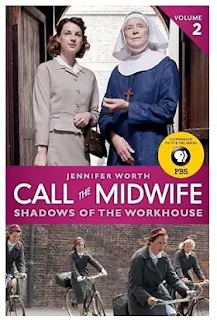Shadows of the Workhouse
By
Reviewed by
Yesterday I finished reading the vivid
tale, Shadows of the Workhouse by Jennifer Worth. Jennifer tells the heart
wrenching stories of the denizens inhabiting the pest-infected slums of the
Isle of Dogs. It’s these colourful East Enders who spent early years in
London’s workhouses who tell their tales as they live out their lives in the
shadows of the workhouse.
Although it seemed the workhouses were
originally meant to provide basic sustenance for the poor and unemployed, the
harsh discipline and separation of family members meant that these poor
Londoners were stripped of the nurturance that comes from human warmth found in
a mother’s arms or the familiar voice of a brother or sister.
One boy found employment, set up his own
business, and rescued his younger sister from their workhouse, but learned his
mother, who was shunted off to another location, had died. One old soldier
joined the army hoping to help his mother and siblings avoid the workhouse. His
army digs seemed like a bit of luxury. Whilst many served as cannon fodder, he
survived his stint in South Africa and became a career postal worker.
Tragically, his loving wife and all his children died during the first and
second World Wars. We discover him alone and visually impaired living in a derelict
old tenement when Nonnatus House nurse Jennifer comes to treat his ulcerated
legs and retell his amazing life story of trauma and survival punctuated with
moments of love and laughter.
Jennifer includes a comic interlude as we
learn that the elderly Sister Monica Joan is charged with theft of some fine
jewels. She’s in court. Is she round the bend? A psychiatrist and psychologist
weigh in with ancient understandings of aging and psychopathology. The
surprising outcome sounds like the twist you find in a well-written novel.
In the Shadows of the Workhouse isn’t for
everyone. But for me, it’s not just an entertaining look at a bit of hometown
history but it helps provide a context for my ancestors’ lives. Most of may
family have lived in or near London for centuries. Some lived in workhouses or
nearby, some served in Britain’s many wars, and others, including my parents,
survived the Blitz. And in my early years, I had a brief stay, separated from
my parents, in an old London hospital at a time when Jennifer and her nurses
were helping those so much worse off than we were in our one-bedroom flat.
So, of course I recommend the book.
Ad
Learn more about British Culture in Mind the Gap
available on AMAZON
Geoffrey W. Sutton, PhD is Emeritus Professor of Psychology. He retired from a clinical practice and was credentialed in clinical neuropsychology and psychopharmacology. His website is www.suttong.com
See Geoffrey Sutton’s books on AMAZON or GOOGLE STORE
Follow on FACEBOOK Geoff W. Sutton
TWITTER @Geoff.W.Sutton
You can read many published articles at no charge:
Academia Geoff W Sutton ResearchGate Geoffrey W Sutton


Comments
Post a Comment